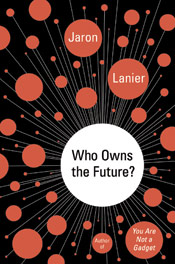(Simon & Schuster, 396 pages, $28)
By Jaron Lanier
 Before attempting to answer the monumental question posed by the title of this book, perhaps it would be helpful to first clarify who’s doing the asking. Silicon Valley visionary Jaron Lanier is a fascinating, lively character: a computer scientist and technological pundit who made his name by bolstering the ideology of a digital utopia—a future of free information in which he vocally advocated the “right” to freely pirate the work of artists and musicians on the grounds that it was “just information.”
Before attempting to answer the monumental question posed by the title of this book, perhaps it would be helpful to first clarify who’s doing the asking. Silicon Valley visionary Jaron Lanier is a fascinating, lively character: a computer scientist and technological pundit who made his name by bolstering the ideology of a digital utopia—a future of free information in which he vocally advocated the “right” to freely pirate the work of artists and musicians on the grounds that it was “just information.”
And yet in Who Owns the Future?, Lanier has done a complete about-face, fully acknowledging that he is now criticizing the very ideas he helped to formulate. He’s staging an intervention between ordinary people and the behemoth “big data” digital companies that increasingly own more and more of our information. “I make no claims to be an economist,” he admits, but Who Owns the Future? is a cautionary tale, stating that we’ve given up too much of our privacy to big data corporations, and warns of an economic cataclysm and eradication of the middle class if the concept of “free” information keeps to its current trajectory. “We are used to treating information as free,” he says, but there is a price to pay and the average Joe is the one doing the paying.
Lanier expands upon his premise with an engaging series of theories, two of which make up the very heart of his platform. The first is his compelling view of what he calls “Siren Servers”—mega Internet companies like Google and Facebook—which capitalize on the productivity of users in an off-the-books economy. For example, a digital company like Instagram employs only 11 people, yet makes a tremendous amount of money based entirely on the free product supplied by its users, while those people receive no compensation for their product. It’s more feudalism than capitalism, Lanier argues, and our current digital culture has conditioned itself into thinking it’s not only normal, but right.
Lanier’s other theory is based on his belief that the notion of information wanting to be free is a complete falsehood, perpetuated by the “frivolous spirit” fostered on the Internet. Free viewing means someone isn’t getting compensated, which makes it harder for those content creators to make a living. Free information, in Lanier’s view, has the lethal potential of completely crippling the middle class infrastructure. His solution? Quelling the open information economy with a “democratic information economy”—proportionate compensation for contributions to these big data Siren Servers.
Lanier’s urgent warning about a brave new world perhaps raises exponentially more questions than it answers, but at the end of the day, Who Owns the Future? is about posing the questions necessary to begin finding those answers.
Review written by Carley Johnson